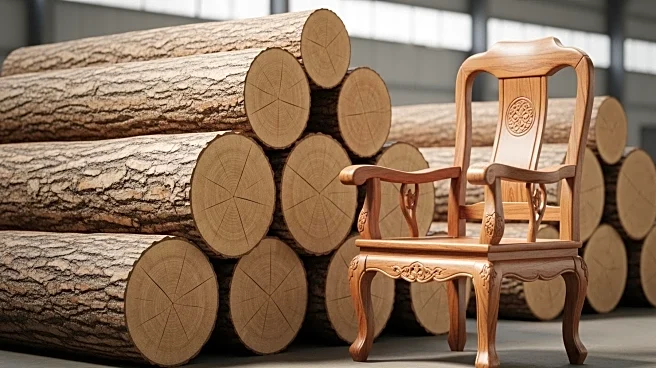What is the story about?
What's Happening?
President Trump has announced a new 10% tariff on wood imports, while delaying the implementation of 25% duties on kitchen cabinets, bathroom vanities, and upholstered furniture until October 14. The announcement was made through a White House proclamation, following initial details shared on social media. Trump has justified these tariffs by citing national security concerns, arguing that mass imports of softwood lumber are negatively impacting the U.S. economy, particularly leading to the closure of U.S. wood mills. The proclamation emphasized the importance of maintaining manufacturing capabilities in the wood and lumber sector for national security. Canada, the largest supplier of softwood lumber to the U.S., is notably affected, facing existing anti-dumping tariffs of approximately 35%. In response, Canada plans to offer up to C$1.2 billion in aid to its lumber manufacturers. Meanwhile, countries like the United Kingdom, the European Union, and Japan will receive more favorable tariff treatment due to existing trade deals with the U.S.
Why It's Important?
The imposition of tariffs by President Trump is significant as it impacts international trade relations and domestic industries. The tariffs are intended to protect U.S. manufacturing and bolster national security, but they also risk increasing costs for U.S. businesses and consumers. The U.S. Chamber of Commerce has expressed opposition, arguing that these tariffs could raise costs for businesses and home construction, undermine the export success of the U.S. paper industry, and reduce incomes in various communities. The tariffs could also strain relations with Canada, a key trading partner, and affect the global supply chain dynamics, particularly in the lumber and furniture sectors.
What's Next?
The future of these tariffs may hinge on a pending Supreme Court decision regarding President Trump's authority to impose such tariffs under emergency economic powers. If the court rules against Trump, it could lead to a rollback of these tariffs. Additionally, foreign nations affected by the tariffs may seek to negotiate trade agreements to avoid higher duties. The U.S. Chamber of Commerce and other industry stakeholders are likely to continue lobbying against these tariffs, emphasizing their potential negative impact on the economy. The situation remains dynamic, with potential changes depending on legal outcomes and international negotiations.
Beyond the Headlines
The tariffs highlight broader issues of trade protectionism and its implications for global economic relations. They raise ethical questions about the use of national security as a justification for economic measures and the potential for such policies to disrupt international cooperation. Long-term, these tariffs could influence shifts in global manufacturing locations and strategies, as countries and companies adapt to changing trade policies. The situation also underscores the complexity of balancing domestic economic interests with international trade obligations.














